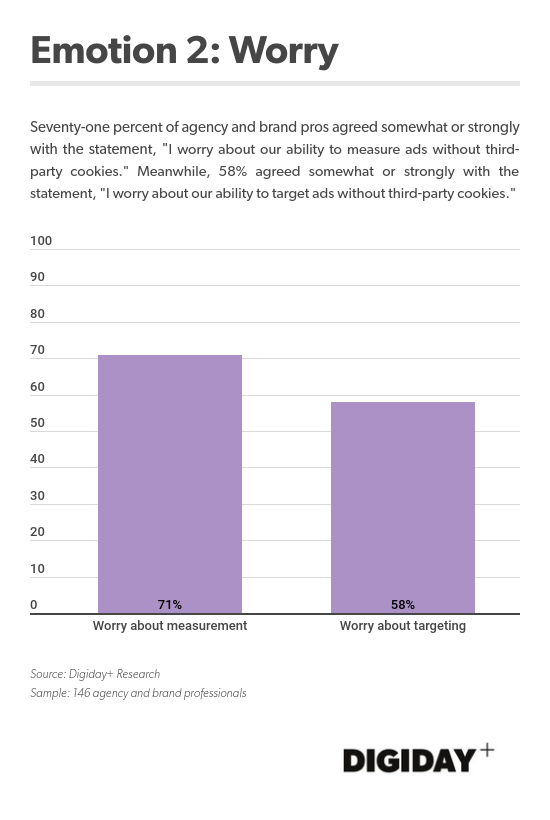Secure your place at the Digiday Media Buying Summit in Nashville, March 2-4
Digiday+ Research: Emotions are mixed among agency, brand execs amid cookie deprecation

This research is based on unique data collected from our proprietary audience of publisher, agency, brand and tech insiders. It’s available to Digiday+ members. More from the series →
Third-party cookie deprecation brings with it an emotional roller coaster for marketers — from confusion about what will come next to bursts of innovation brought on by the need to think about audiences and metrics differently. Digiday took to the source to learn more about the gamut of emotions being felt by agencies and brands as the end of the third-party cookie approaches.
Overall, Digiday+ Research found that agency and brand executives’ mixed emotions range from understanding why Google is eliminating the third-party cookie, to worry concerning their abilities to target and measure ads, to relief that the end of the third-party cookie has been delayed.
Of the 146 agency and brand professionals Digiday surveyed in April, an overwhelming 72% said they understand why Google is eliminating third-party cookies.
It is likely that feeling of understanding will lead to acceptance among industry leaders — and, eventually, to the ability to rally around a new standard for ad measurement and targeting.
Speaking of measurement and targeting, the feeling of understanding respondents identified is intertwined with worry for the future of their businesses: 71% of the agency and brand execs surveyed by Digiday said they’re worried about the ability of their businesses to measure ads after third-party cookies go away, and 58% said they’re worried about their ability to target ads.

And the emotional roller coaster takes yet another turn — add relief to the list of feelings agency and brand pros associate with the end of the third-party cookie (or the delay of it, anyway). Nearly two-thirds (63%) of respondents to Digiday’s survey agreed that they were relieved when Google announced it would delay the death of the cookie.
The winners and losers in the post-cookie world remain to be seen, but it’s fair to expect that the mixed emotions agency and brand execs are feeling now will likely be even more keenly felt the closer the industry gets to the end of next year when Google has set the deadline to disable the use of third-party cookies.
More in Marketing

Future of Marketing Briefing: AI’s branding problem is why marketers keep it off the label
The reputational downside is clearer than the branding upside, which makes discretion the safer strategy.

While holdcos build ‘death stars of content,’ indie creative agencies take alternative routes
Indie agencies and the holding company sector were once bound together. The Super Bowl and WPP’s latest remodeling plans show they’re heading in different directions.

How Boll & Branch leverages AI for operational and creative tasks
Boll & Branch first and foremost uses AI to manage workflows across teams.





